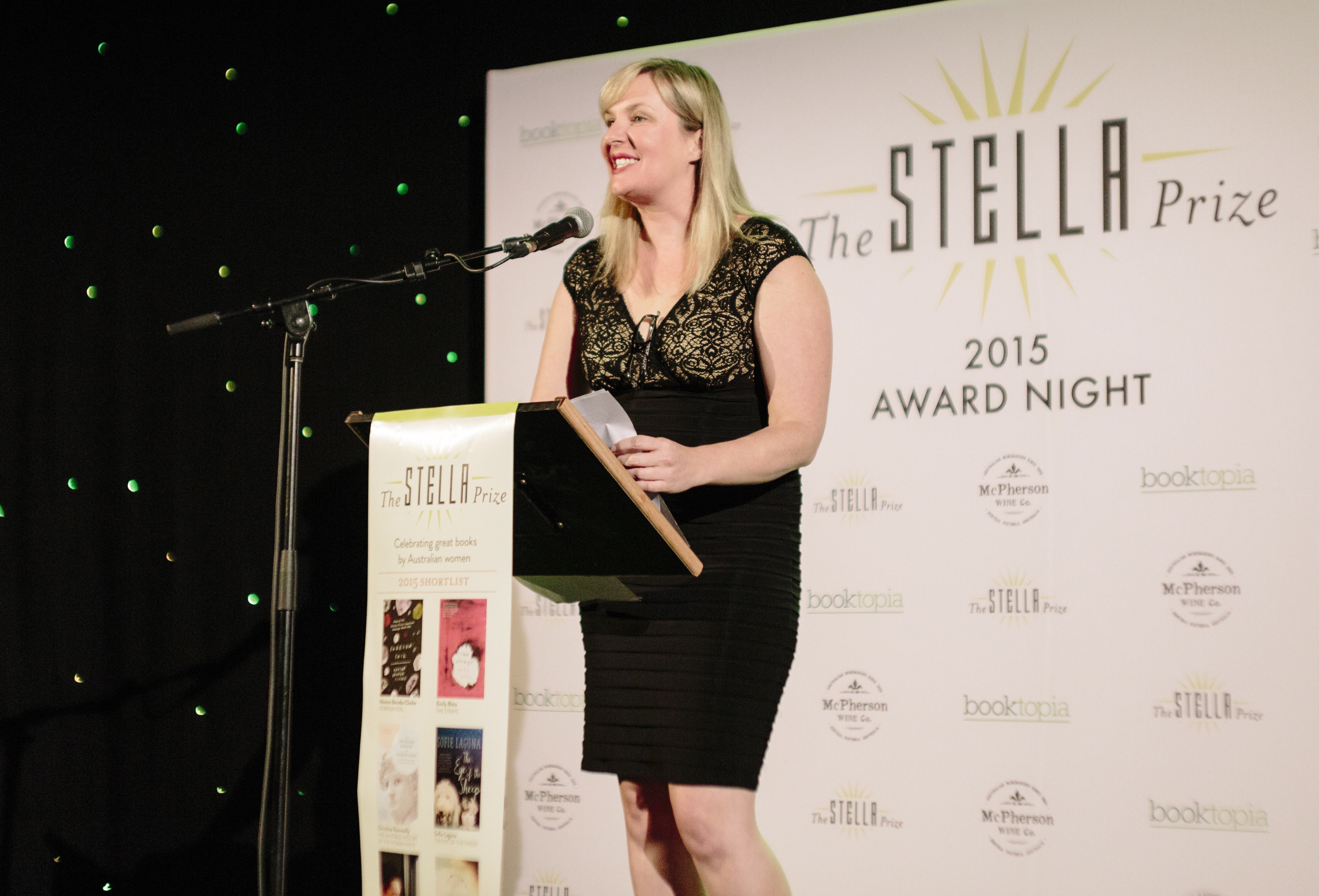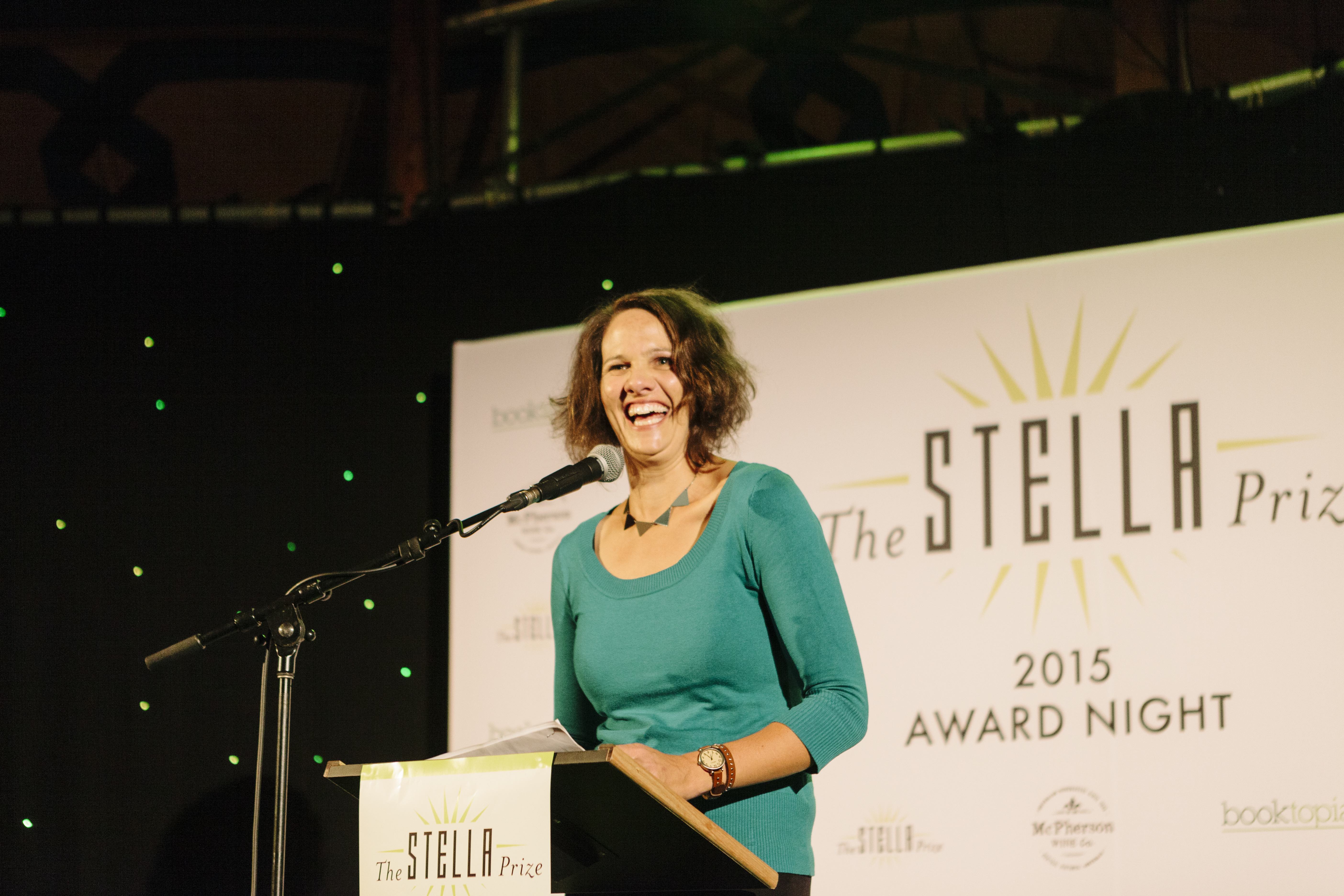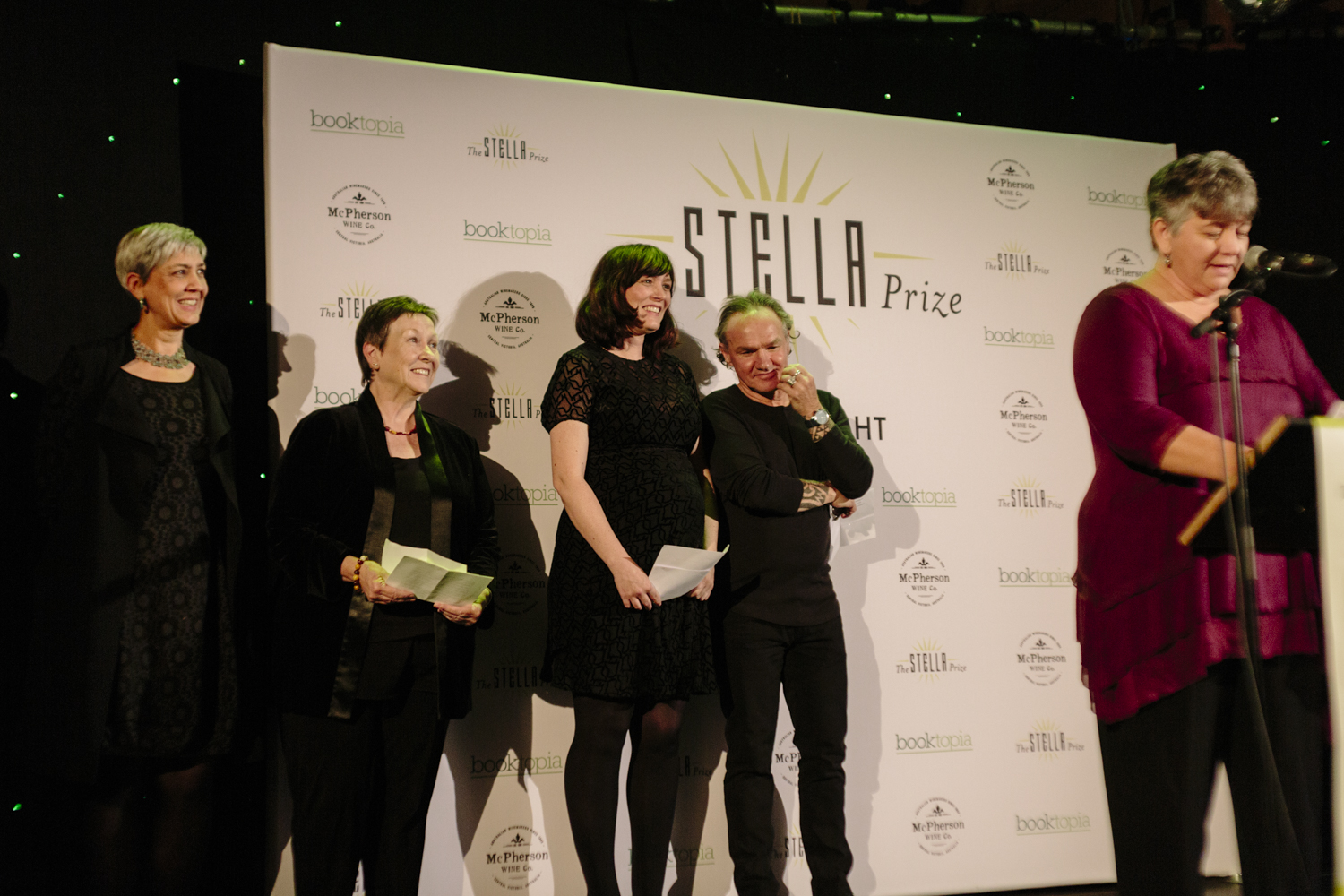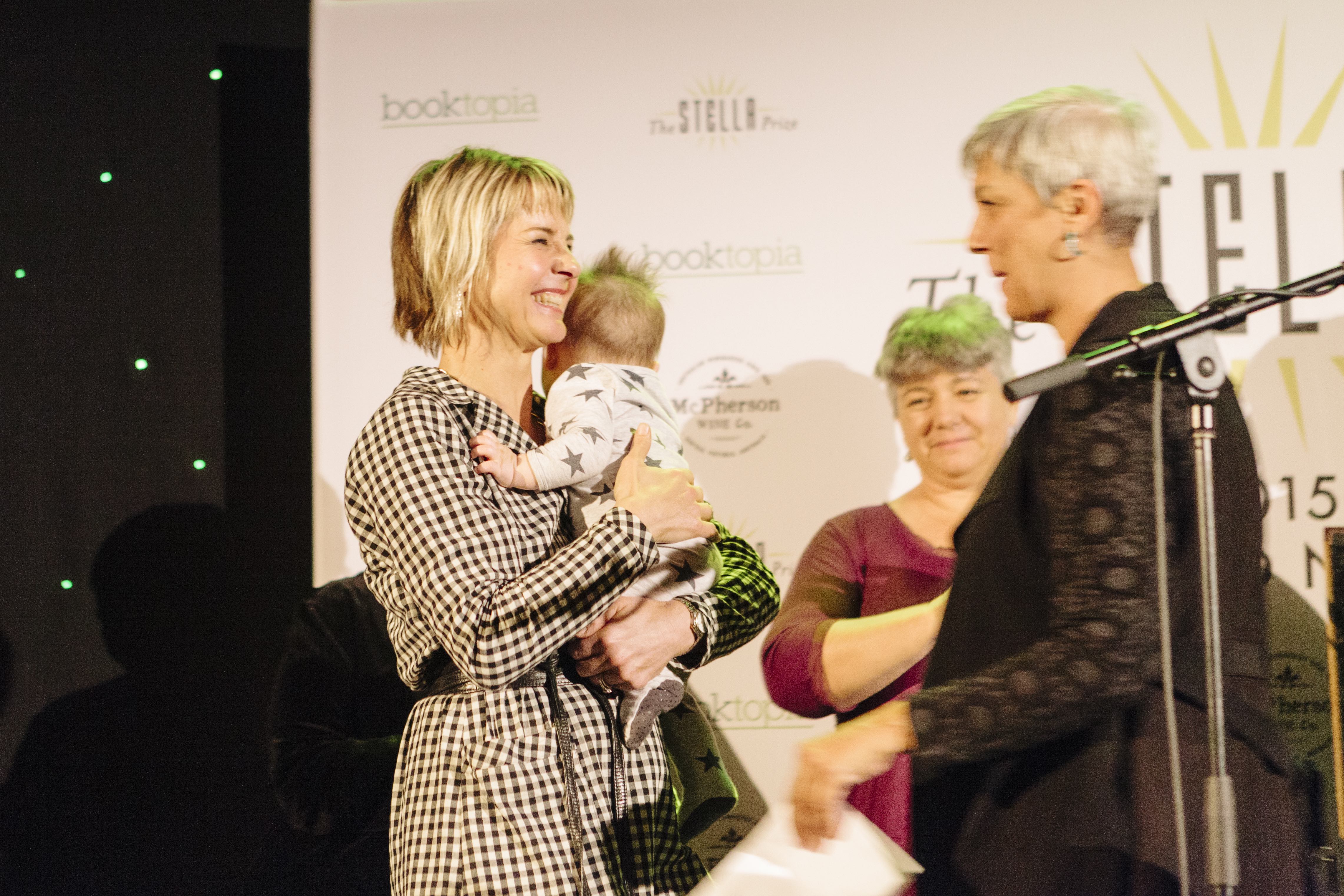The 2015 Stella Prize Award Night: Speeches and pictures

On Tuesday 21 April 2015, Emily Bitto’s debut novel The Strays was awarded the 2015 Stella Prize at an event at the Melba Spiegeltent in Melbourne. Here are the fabulous speeches delivered on the night by Chloe Hooper, Kerryn Goldsworthy and Emily Bitto, along with a selection of photos from the evening.
Chloe Hooper – Award-winning author of The Tall Man

Chloe Hooper gave a brilliant keynote speech:
The six books on the Stella Prize shortlist provide a wonderful measure of the Australian literary scene’s vitality in 2015, and I want to congratulate each writer on her achievement. I don’t need to tell the six of you that often much of writing can be lonely and unsatisfying, and so I hope that regardless of who wins tonight you can all savour this accolade.
‘That’s easy for her to say,’ you might be thinking, ‘she doesn’t have fifty grand at stake.’ More’s the pity. It’s true this wisdom comes easily when you’re not on the shortlist.
When Aviva Tuffield, the Prize’s Executive Director, asked me to speak tonight I thought, ‘what a great honour,’ … and also, that is the last thing in the world I want to do. I was at home with our three-year-old and a new baby, shivering with mastitis, thinking I don’t want to walk to the living room let alone try to find vomit-free clothes and venture outdoors to the bright lights of the Spiegeltent. I felt I had nothing to say. Actually, I knew I had nothing to say. A combination of sleep deprivation and the wonderful ground-hog-day tedium of life with small children had left me with as much wit as my son’s puppet show charactered with Mr Poo and Mr Wee.
And speaking of those characters: It’s a strange experience to suddenly stop writing in the middle of your career – when you’re finally through the difficult straits of being a kind of apprentice writer, when you feel yourself able to actually do the job – and find yourself instead spending your day basically wiping up small bottoms.
Anyway … Aviva was now sending messages to my publisher wondering politely if her initial email to me had perhaps been lost? I needed to reply, but the longer I left it the more lame any excuse sounded. The truth was I felt cut off from the writing world, and it had left me slightly mute. And in that moment the penny dropped … I get to use clichés like that because I’m a nursing mother with a cold who still isn’t getting much sleep. But the penny dropped. And I realised not wanting to speak wasn’t without its own little gender subplot.
Obviously it’s a luxury to be speaking about not wanting to speak. It’s a privilege to have a voice and therefore it has to be used. I will say though that a reluctance to take up the microphone – although not a purely female affliction – has historically disabled more women than men, and probably served to delegitimise the experiences of their daily lives. The eminence of women in Australian literature, which dates back to the last decades of the nineteenth century, has not been matched in politics or the other realms of Australian life. Our culture is not kind to outspoken women. And there are many reasons even in 2015 to go about things quietly, to not talk about uncomfortable truths, to not document in fiction or nonfiction borderline feelings or fascinations, to not challenge the status quo, in essence to not find one’s own voice let alone raise it. Therefore, for these six writers to have done so with such grace and, in different ways, bravery, makes this evening honoring them a very special one. I want to applaud your work, your outspokenness, and wish you and the Stella Prize every future success.
Kerryn Goldsworthy – Chair of the 2015 Judging Panel

Kerryn Goldsworthy announced the winner:
This is my third and last year as a Stella Prize judge, so tonight is my last chance to say publicly what an honour it has been to be involved with the prize from its earliest days. It’s also my last chance to say publicly what a pleasure it has been to work on the prize with the many people who have helped to make the idea of it a reality.
A literary prize is by nature a hierarchical enterprise. At the end of the process, one person will end up alone at the top of the tree like the Christmas fairy. But within that inevitable structure, the Stella Prize is a team effort, with people working together laterally across the landscape of the prize in all its various aspects: the administration, the judging, the fundraising, and the various spinoff projects and programs.
From its very earliest days, Stella has been a collective enterprise. Its driving forces have been consultation, cooperation, and consensus. This was true of the small group of women who first got together several years ago to see if they could do something positive about the unconscious bias of which they could see so much in the literary world. It was true of the original steering committee that first set up the prize. It has always been true of the Stella Prize Board as it evolved. And it has always been true among the judges.
There are now hundreds of people who have played some part in maintaining the prize and expanding its horizons. The more visible of these people are the Director and the members of the Board; the judging panels past and present; and our two past winners, Carrie Tiffany and Clare Wright, who have both been such energetic and effective ambassadors. But there are many more who have contributed to the prize behind the scenes. There are the many people who have donated money; there are the booksellers and publishers who have supported the prize; and the Stella interns and volunteers who have worked hard for it. And there are those who have contributed in other ways with their time, with their expertise, and with other less tangible forms of support.
But there are two I’d especially like to mention: two people without whom the prize could never have come so far so quickly. One is our magnificently generous Founding Patron, the Melbourne philanthropist Ellen Koshland, who guaranteed the financial security of the prize in its tentative earliest days. The other is the Stella Prize Manager, Megan Quinlan, who for three years now has been organising everything to do with the workings of the prize right down to the smallest detail: Megan is one of the most efficient, one of the most energetic, and one of the most tactful human beings I’ve ever met.
And now for the woman at the top of this year’s tree. Late last year when I first picked up her book and read the opening paragraph, I felt quite stunned and had to go back and read it again. It was one of the most measured, most assured, and most quietly powerful opening paragraphs I have ever encountered in a work of contemporary Australian fiction, and I was glad to see that standard maintained for another 289 pages. Its author, and the winner of the Stella Prize for 2015, is Emily Bitto for her novel The Strays.
Emily Bitto – Winner of the 2015 Stella Prize for The Strays

2015 Stella Prize winner Emily Bitto gave a beautiful, gracious acceptance speech:
First and foremost I would like to thank the Stella Prize – the original vision of the organising committee, the current board, the wonderful staff, the generous donors and, of course, the judges – for this incredible honour and life-changing opportunity. As a debut writer, this is really is the most amazing thing that has ever happened to me!
Before anything else, I want to acknowledge the absolutely extraordinary talent of the women on both the long- and shortlists this year. These are incredible women, and their work is what’s making the Australian literary scene the rich and truly exciting place it currently is. Please join me in applauding these exceptional writers.
Next, I want to thank my partner, Hootan. Richard Ford wrote a list of 10 pieces of ‘advice to writers’ for The Guardian, and the first one was: ‘Marry someone you love and who thinks you being a writer is a good idea.’ I think the wisdom of that advice can’t be overestimated, and for women writers, I think, it is especially valid. Before even beginning to encounter the gender biases that one faces as a published writer, the home is the first battleground for women who want to write. As I’m sure we all know, women, statistically, bear the brunt of domestic labour, and having a partner who supports and values your writing enough to share that equitably, as well as providing genuinely un-resentful encouragement as you embark on what will most likely be a testing and financially unrewarding career is not just a bonus, but an absolutely fundamental necessity. So, thank you, Hootan, for making me feel like being a writer is a good idea, even at its hardest.
I have many other people I want to thank, but first I want to say a few words about why the Stella Prize, in particular, and its founding intentions mean so much to me.
The Strays was born out of a creative writing PhD that I completed at Melbourne Uni in 2013. The other half of that PhD was a research project and, in that research, I investigated the ways in which the figure of the artist, in the broad sense of creative practitioners of all kinds, is represented in contemporary western literature and culture. What became clear in the process of that research was the power and endurance of a particular myth of the artist, and of creativity, one that came to dominance during Romanticism but that still has a firm hold today. Basically this myth says that the true artist not only produces exceptional works of art but is characterised by an exceptional nature, and is ultimately above the ordinary run of humankind.
Women, with their association with the ‘too ordinary’ realm of the domestic, have historically been excluded from the category of artist. If they did produce works of literature, or visual art, for example, they were referred to as dabblers, hobbyists, craftswomen, or by that damning term ‘lady novelists’. But more than that: there was seen to be something essential about femaleness that was anathema to creative prowess, and women who did obtain success were often considered to have lost their femininity in the process.
As recently as 1962, the English sculptor and academic Reg Butler asked the following rhetorical question in a public lecture: ‘Can a woman become a vital creative artist without ceasing to be a woman except for the purposes of a census?’
For anyone who makes the choice to dedicate their life to creative production of any kind, it’s bloody hard. But to know that, simply because of your gender, you are statistically less likely to win the prizes and get the critical recognition that are a large part of enabling writers to have a somewhat sustainable career, is quite maddening. A lot of my thinking about the figure of the artist and the creative life found its way, in a much less academic and didactic form, into The Strays.
So, for someone who has thought about this stuff – a lot – there is no prize I would rather have won than the Stella Prize, a prize born out of a recognition of the gender imbalance that still, quantifiably, exists in the literary world, and that attempts to redress that imbalance.
I can’t even begin to measure the benefits that this prize will bring in terms of my career as a writer. But I do know that the prize money will give me more than a full year in which I will be able to just write, and I cannot express how precious that is. I dearly love the Stella Prize for what it is giving Australian women writers, and for the way it has made such a proactive and audacious intervention in the Australian literary world and general public discourse.
On the subject of prize money … The first two Stella winners, Carrie Tiffany and Clare Wright, generously gave away a portion of their prize winnings: Carrie to the other shortlisted writers; and Clare to the Indigenous Literacy Foundation and to founding a women’s history prize at her local public high school.
Now, as the third winner of the prize, I feel myself to be in an interesting position. If I choose to publicly donate a portion of my prize money, I will really cement the precedent set by Carrie and Clare. On the one hand, I don’t want to create what could be felt as an oppressive obligation for future winners, in a context that is meant to be about alleviating the constraints and pressures women face already. On the other hand, I think it’s a fantastic precedent. There are a number of organisations whose work I passionately believe in, mainly those that focus on the environment and animal rights. The way humans behave towards the non-human world, and particularly animals, is something that absorbs and horrifies me on a daily, hourly basis. I’ve thought a lot about this, and I’ve made the decision to donate a portion of my prize to the Wilderness Society, whose work I think is of absolutely vital importance.
Now, finally, I just want to thank a few people who are very important to me. My PhD supervisor, Kevin Brophy – the first reader of The Strays, and such an intelligent and generous reader and mentor. Affirm Press, who gave The Straysa home, and have been so supportive and an absolute joy to work with. My agent, Clare Forster of Curtis Brown, who has my back.
I’d also like to thank the amazing Melbourne writing community that I feel incredibly lucky to be a part of. It’s talking to other writers that makes this whole caper actually feel good and fun, and I’ve experienced such warmth and generosity, from both established and emerging writers, as I’ve started out. Thank you especially to Antoni Jach and my little Masterclass gang. And to Michael Gawenda, Helen Garner, Kalinda Ashton, Claire Thomas and Maxine Beneba Clarke, among many others.
Finally, I want to thank my family and friends. Especially my parents, who, amazingly, also seem to think my being a writer is a good idea. My mum, Pam, who read to me every night when I was a child. My dad, Peter, who taught me that everyone around me has an interesting story, if you just listen. My stepdad, Alan, and stepmum, Sandra, who have given me so much love and encouragement. My aunt Annie, who taught me about art and showed me how to look at the world in an observant, alive manner. My brother and sister, who I adore.
And I want to end by thanking my friends – particularly my female friends. At its heart, The Strays is about female friendship, and I can’t express enough gratitude to the women in my life, whose solidarity and friendship and conversation are just the best things in the world.
Here’s to female friendship. To women supporting other women. Here’s to the Stella Prize!
More photos from the night
The 2015 Stella Prize shortlisted authors: Maxine Beneba Clarke, Sofie Laguna, Emily Bitto, Christine Kenneally and Ellen van Neerven (Joan London was overseas)
Each shortlisted author received $2000 prize money, courtesy of the Nelson Meers Foundation.

Our witty MC for the evening was Corinne Grant

Chair of the Stella Board, Louise Swinn

The 2015 Stella Prize judges: Caro Baum, Kerryn Goldsworthy, Sarah Blasko, Tony Birch and Melissa Lucashenko

Maxine Beneba Clarke and Melissa Lucashenko

Ellen van Neerven

Sofie Laguna and Caro Baum

Christine Kenneally watches as Tony Birch describes her shortlisted book

2014 Stella Prize winner Clare Wright and 2015 winner Emily Bitto

The beautiful Melba Spiegeltent

Emily Bitto

Thanks to our major sponsor for the Stella Prize Award Night, Booktopia.
Wine was generously provided by McPherson Wine Co.
The official bookseller was Avenue Bookstore.
All photos by Teagan Glenane.





